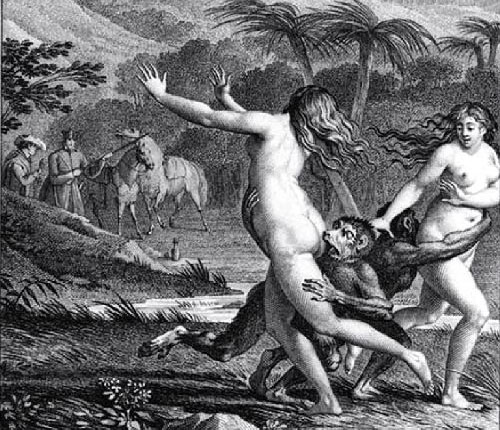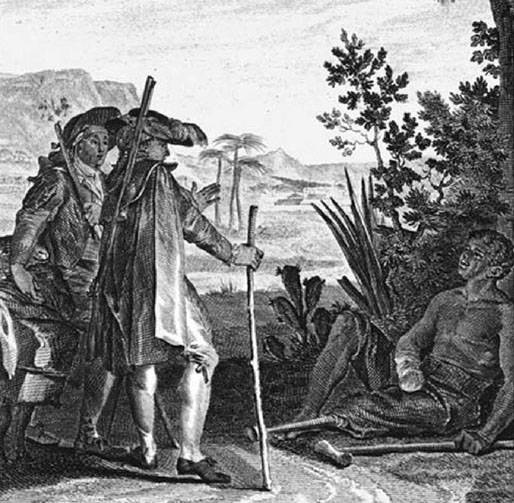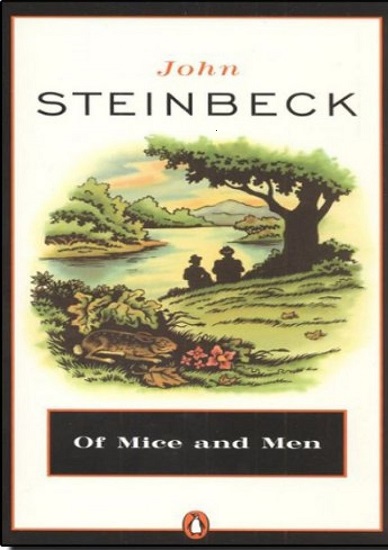All Controversial Themes
John Steinbeck’s novella, Of Mice and Men, is controversial for its use of vulgarity, racist language and what censors considered a demoralizing, negative theme (that is, mercy killing). Of Mice and Men is a story of two migrant workers, George and Lennie, seeking opportunities on ranches in California during the Great Depression period. Lennie is large and strong but mentally disabled. He consistently gets the pair in trouble. He had childishly felt the soft dress of a woman on the ranch where they had been working triggering screams and accusations of rape. They had to flee before a mob captured them. Despite everything, there’s a bond of loyalty and love between them. As they’re approaching the farm where they’ll work, Lennie asks George where they’re going and George responds:
“So you forgot that awready, did you? I gotta tell you again, do I? Jesus Christ, you’re a crazy bastard!”1John Steinbeck, Of Mice and Men (New York: Covici Friede, 1937; reprint, London: Penguin Books Ltd, 2014), 4.
George warns Lennie against talking when they meet the new boss. He can’t guarantee that the boss will be welcoming when he finds out that one of them is mentally deficient:
“That ranch we’re goin’ to is right down there about a quarter mile. We’re gonna go in an’ see the boss. Now, look- I’ll give him the work tickets, but you ain’t gonna say a word. You jus’ stand there and don’t say nothing. If he finds out what a crazy bastard you are, we won’t get no job, but if he sees ya work before he hears ya talk, we’re set. Ya got that?”2Ibid., 6-7.
On the farm, they meet an old “swamper” (handyman), Candy, who tells them that the boss was angry that they hadn’t arrived the night before as they were meant to (that’s when we’re introduced to the racial theme):
He was sure burned when you wasn’t here this morning. Come right in when we was eatin’ breakfast and says, ‘Where the hell’s them new men?’ An’ he give the stable buck hell, too.”
George patted a wrinkle out of his bed, and sat down. “Give the stable buck hell?” he asked.
“Sure. Ya see the stable buck’s a nigger.”
“Nigger, huh?”
“Yeah. Nice fella too. Got a crooked back where a horse kicked him. The boss gives him hell when he’s mad. But the stable buck don’t give a damn about that. He reads a lot. Got books in his room.”3Ibid., 21-22.
The son of the farm’s boss, Curley, is an insecure man who had recently married a woman known for being flirtatious among the ranch workers. Candy, the swamper, shares a obscene joke about him with George:
“You seen that glove on his left hand?”
“Yeah. I seen it.”
“Well, that glove’s fulla vaseline.”
“Vaseline? What the hell for?”
“Well, I tell ya what- Curley says he’s keepin’ that hand soft for his wife.”
George studied the cards absorbedly. “That’s a dirty thing to tell around,” he said.4Ibid., 30.
When Curley’s wife shows up, George senses trouble and after she leaves he warns Lennie from engaging in conversation with her:
“Listen to me, you crazy bastard,” he said fiercely. “Don’t you even take a look at that bitch. I don’t care what she says and what she does. I seen ’em poison before, but I never seen no piece of jail bait worse than her. You leave her be.”5Ibid., 36.
Not realizing how strong Lennie is, Curley picks a fight with him and gets his hand crushed in return. Later, while most workers are in town to visit a whorehouse, Curley’s wife sees Lennie and Candy in the room of the black man, Crooks. As always she feels lonely and neglected, so she tries to socialize with them. Crooks warns her as he warned Lennie earlier that they’re not supposed to be in a black man’s room. Her response was nasty and threatened of lynching:
She turned on him in scorn. “Listen, Nigger,” she said. “You know what I can do to you if you open your trap?”
Crooks stared hopelessly at her, and then he sat down on his bunk and drew into himself.
She closed on him. “You know what I could do?”
Crooks seemed to grow smaller, and he pressed himself against the wall. “Yes, ma’am.”
“Well, you keep your place then, Nigger. I could get you strung up on a tree so easy it ain’t even funny.”6Ibid., 91.
Curley’s wife drops in on Lennie who was alone in the barn and invites him to caress her hair. He gets too excited and holds it tightly. She panics and tries to free herself. Afraid her screams will alert George that he’s broken the rule of avoiding her, he covers her mouth and accidentally breaks her neck. Shocked at the lifeless body of Curley’s wife, he drops it and runs away to a hiding place agreed on with George in case trouble happens as it did at the previous ranch. Soon after, everyone finds out. Furious Curley, joined by other workers, start a search for Lennie to deliver vigilante justice. George runs to the designated hiding place. He realizes that the lynch mob will eventually find him and could possibly subject him to a cold-blooded punishment, especially that Curley had a fight with Lennie earlier. He makes a painful yet merciful decision towards his life-long friend:
And George raised the gun and steadied it, and he brought the muzzle of it close to the back of Lennie’s head. The hand shook violently, but his face set and his hand steadied. He pulled the trigger. The crash of the shot rolled up the hills and rolled down again. Lennie jarred, and then settled slowly forward to the sand, and he lay without quivering.7Ibid., 120.
You might also like:

Candide: The shocking passages
Condemned by the French government and the Catholic Church: Read the controversial passages from Voltaire’s Candide (1759)
BOOK: CANDIDE

Voltaire’s radical views on race and slavery
Understanding Voltaire’s view on race and slavery through the eyes of Candide
BOOK: CANDIDE
Endnotes





